John Lennon Appreciation Month #1
A/N: 9th Oct 2017 - Over on Tumblr, it's John Lennon Appreciation Month! A month of John Lennon orientated creativity. I thought I would crosspost some of my things here too. Anyone can join in - you can write, draw, photoshop, or do pretty much anything. Go to https://lennonnine.tumblr.com/ and https://lennonnine.tumblr.com/tagged/activities if you want to join in too.
* * *
John Lennon Appreciation Month #1
What's your favourite Beatles song? (sang by him)
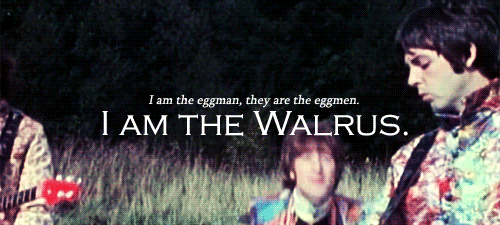
Narrowly squeezing this in for the first week of John Lennon Appreciation Month! I don't think there is a John song I don't like. There are many, many outstanding ones - A Day In The Life, Come Together, Across The Universe, Help!, All You Need Is Love... I could have picked lots, but I've chosen I Am The Walrus, the main reason being although this is a much loved song and a pub jukebox classic, I think I Am The Walrus is overlooked as a John Lennon masterpiece. It's more than just nonsensical and fun, it's not a throw-away song like it may appear on the surface, I think it's one of John's finest works, and here's why...
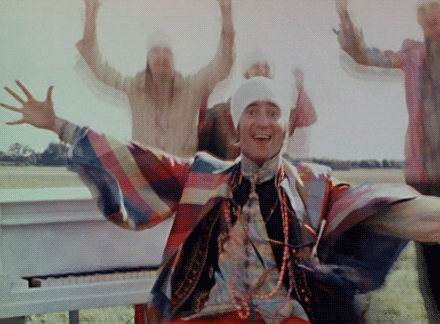
1. John couldn't write a meaningless song if he tried
...which is just what he was doing with I Am The Walrus.
"Walrus is just saying a dream. The words didn't mean a lot. People draw so many conclusions, and it's ridiculous. I've had tongue in cheek all along–all of them had tongue in cheek. Just because other people see depths of whatever in it...What does it really mean, 'I am the Eggman?' It could have been 'The pudding basin' for all I care. It's not that serious."
[John]
In Summer 1967, John received a letter from a pupil at Quarrybank High School (John's high school in Liverpool) telling him that his English teacher was having his class analyse Beatles lyrics (In particular, Strawberry Fields Forever). I've read contradicting accounts that John was either amused or appalled that English teachers would consider his 'pop song' lyrics worthy of literary analysis and critique (he was probably both). Either way, he wrote I Am The Walrus as a response, deliberately filling it with nonsensical lyrics, surreal and dream like imagery and random references in the vein of his favourite author and poet, Lewis Carroll. "Let the fuckers work that one out!" he said to Pete Shotton according to Hunter Davies Beatles biography.
So, challenge accepted! Although John sets out to confuse and write a meaningless song, I Am The Walrus is full of meaning. One element in John's songwriting is that he almost always writes about himself. He writes about his feelings, his interpretation of the world and his own experiences. In contrast to Paul, who often uses characters and others to tell the narrative of his songs, (Eleanor Rigby, Lovely Rita, Maxwell's Silver Hammer, Mr Bellamy, etc, etc) John seems only able to write about himself at the centre of any song or subject, so in setting out to write I Am The Walrus he writes about the world around him at the time and what is happening to him. Even though he tries to be the 'Walrus', he's still John.
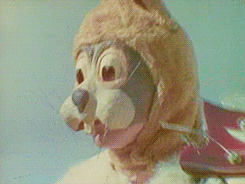
2. Jabberwocky
Jabberwocky is a nonsense poem by Lewis Carroll about the killing of a creature called a Jabberwocky. In the poem Carroll used made-up words, which might have sounded like another word or might have sounded like it should mean something, but it wasn't a real word. (Jabberwocky gave us the words 'Chortle' - a blend of chuckle and snort, and 'Galumphing' - a combination of gallop and triumphant and loads of others). John had his own brand of Jabberwocky, which he used all the time. ("I was bored on the 9th of Octover 1940 when, I believe, the Nasties were still booming us led by Madolf Heatlump (who only had one). Anyway they didn't get me. I attended to varicous schools in Liddypol. And still didn't pass – much to my Aunties supplies.")
To write like this is harder than to write in a regular way. There are tons of examples of Jabberwocky style and seemingly nonsense lyrics in I Am The Walrus. But they're not meaningless and completely made up. They refer to other things going on around John at the time.
*I am he as you are he as you are me and we are all together: from the song "Marching to Pretoria," which contains the lyrics, "I'm with you as you're with me and we are all together."
See how they run like pigs from a gun, see how they fly: This, John said, was inspired by an acid trip, but I think the flying pig harks back to the Alice in Wonderland imagery used later in the song.
* Corporation tee-shirt, stupid bloody Tuesday: This might be my favourite line. To me this is about your working week, when you're wearing your corporation t-shirt and it's stupid bloody Tuesday.
* Mister City, policeman sitting pretty little policemen in a row: Sounds like a police siren going past. "Sitting pretty" is a separate meaning I think and those two words are the end of one line and the start of another.
* Semolina pilchard, climbing up the Eiffel Tower: Famously a reference to Sgt Pilcher of the flying squad who was making a name for himself busting celebrities for drugs at the time, whether they had any or not.
* Elementary penguin singing Hare Krishna: John said, "I'd seen Allen Ginsberg and some other people who liked Dylan and Jesus going on about Hare Krishna. It was Ginsberg, in particular, I was referring to. The words 'Element'ry penguin' meant that it's naïve to just go around chanting Hare Krishna or putting all your faith in one idol. In those days I was writing obscurely, à la Dylan." Some poeple suggest it could have been a sly dig at George, though I think it's more likely a reference to the Maharishi. They'd just returned from the weekend in Bangor with the Maharishi. (More on that later)
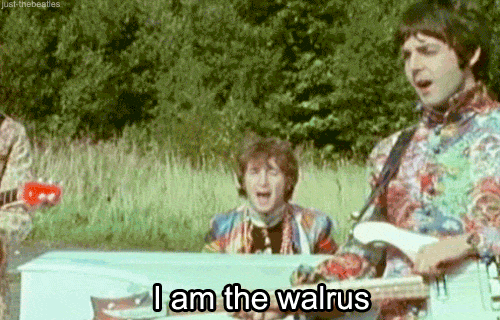
3. John picked the wrong side.
"I like the Walrus best," said Alice, "because you see he was a little sorry for the poor oysters."
"He ate more than the Carpenter, though," said Tweedledee. "You see he held his handkerchief in front, so that the Carpenter couldn't count how many he took: contrariwise."
"That was mean!" Alice said indignantly. "Then I like the Carpenter best—if he didn't eat so many as the Walrus."
"But he ate as many as he could get," said Tweedledum.
This was a puzzler. After a pause, Alice began, "Well! They were both very unpleasant characters—"
[Through the Looking-Glass, Lewis Carroll]
As is well known, John stated "I am the walrus" in reference to Lewis Carroll's poem, The Walrus and The Carpenter, included in one of John's favourite books, Through The Looking-Glass (Sequel to Alice in Wonderland, which John claimed to read at least once a year). Later on, John realised the Walrus was the villain of the story.
"It never dawned on me that Lewis Carroll was commenting on the capitalist system. I never went into that bit about what he really meant, like people are doing with the Beatles' work. Later, I went back and looked at it and realised that the walrus was the bad guy in the story and the carpenter was the good guy. I thought, Oh, shit, I picked the wrong guy. I should have said, 'I am the carpenter.' But that wouldn't have been the same, would it?"
[JOHN, PLAYBOY INTERVIEWS, 1980]
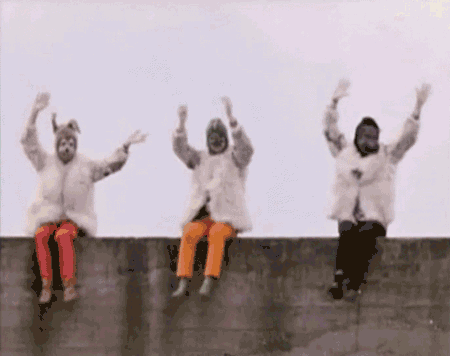
4. I Am The Egg Man, They Are The Egg men.
John replied to that Quarrybank schoolboy in a letter dated 1st September 1967. Five days prior, on the 27th August 1967, Brian Epstein had died. Also on the same day as he wrote the letter - 1st September, John and the other Beatles met at Paul's house to discuss what their future was - if any - now Brian had gone. This is the background context and what was going on at the time John wrote I Am The Walrus and, in my opinion, it's the key to understanding the meaning behind the song. I Am The Walrus was the first song the Beatles recorded after Brian died.
"[After Brian died] We collapsed. I knew that we were in trouble then. I didn't really have any misconceptions about our ability to do anything other than play music, and I was scared. I thought, 'We've had it now.'"
[John, quoted in Anthology]
Also at the time John was reading James Joyce's Finnegan's Wake, where Finnegan falls off a ladder, is presumed dead and has a funeral arranged. He wakes up at his own wake and joins in. This and Brian dying and the uncertain future of the Beatles (felt at the time) combined with Lewis Carroll's imagery of Humpty Dumpty about to fall off the wall (also from Alice...) I think are the main components in John's song. John doesn't refer to Humpty Dumpty by name anywhere, but could the egg men - which John says is both him and the other Beatles - be Humpty Dumtpys. They're sitting on a wall, and now Brian's gone, they're about to fall.
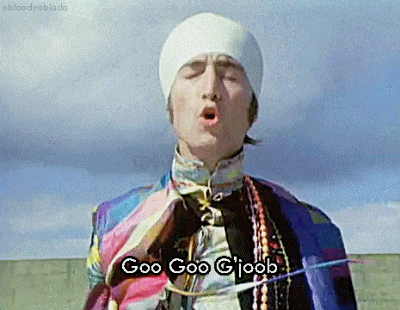
5. Goo Goo Ga Joob
Which brings us to 'Goo Goo Ga Joob' (or however you would like to spell it). The real nonsense words in I Am The Walrus, right? There's an urban legend, which I love, that "Goo Goo Ga Joob" was the last words of Humpty Dumpty before he toppled off the wall (As quoted in Finnegan's Wake). This isn't true, but the actual term Joyce used was "," which is pretty close. The Beatles are the egg men, about to fall off their wall, Goo Goo Ga Joob.
So if you look again at the lyrics, with this context in mind, I see it like this:
I am he as you are he as you are me and we are all together [...]
Sitting on a cornflake, waiting for the van to come,
Corporation tee-shirt, stupid bloody Tuesday
This is the equilibrium at the start of the song - the Beatles (and company) sitting on their cornflakes, waiting for vans, all together.
Then,
Man, you've been a naughty boy, you let your face grow long [...]
Mister City, policeman sitting
Pretty little policemen in a row
See how they fly like Lucy in the Sky, see how they run
I'm crying, I'm crying
I think this could refer to the death of Brian Epstein and the sudden void he left behind. The imagery - the naughty boy who let his face grow long - could that be a depressed Brian? Brian had been in and out of hospital for depression and was on medication for it. Then the image of the police sirens followed by a Lucy In The Sky reference (the Beatles left behind?) and I'm crying would be self explanatory in the context of Brian's unexpected death. The 'mister city' siren is the rhythm of the song - the whole song is a police siren as it races to an emergency.
The next part of the song deals more with the second theme in the song, so I'll skip that and come back to it and go straight to:
Expert textpert choking smokers
Don't you think the joker laughs at you?
See how they smile like pigs in a sty
See how they snide
I'm crying
This verse I see is now the Beatles and/or John facing their unknown future without Brian who'd guided them and they'd followed faithfully since the start. Now the joker is laughing at them and the pigs smile snidely waiting for their downfall (literal and metaphorical).
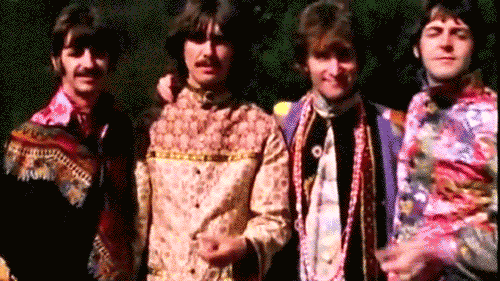
6. Waiting For The Sun.
Sitting in an English garden waiting for the sun
If the sun don't come, you get a tan
From standing in the English rain
No, actually, this is my favourite line in the song. This, I think, is the conclusion to the first theme of the song - what the hell are we going to do now Brian's gone? I think it's a very British image; we'll get on with things and make do. We're still sitting, in a garden now, and if the sun that we're waiting for doesn't turn up then we'll make do with the rain and use that to achieve the result we wanted. This is deliciously ironic too, because that's impossible.
Although, I think the songs a cry of "Help! What are we going to do?!" I think this resolve at the end is upbeat and positive, and it's funny and ironic like John was and like his world view was.
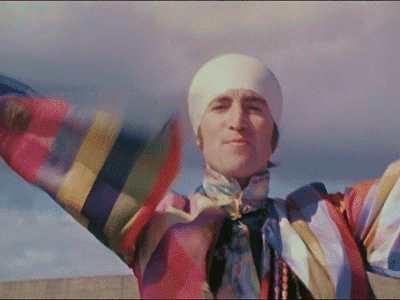
7. Kicking Edgar Allan Poe
The bit I missed out:
Yellow matter custard, green slop pie,
All mixed together with a dead dog's eye,
Slap it on a butty, ten foot thick,
Then wash it all down with a cup of cold sick
Not John's lyrics but undoubtedly what he must have had in mind writing "Yellow matter custard dripping from a dead dogs eye". This is a 1940s/50s schoolyard skipping rhyme, the presence of which I think refers back to the reason John wrote the song - to combat or confuse those school kids, or maybe just their school teachers, who are trying to analyse John's words.
There are more 'school'-ish and literary references through out and a lot of the language is from what could be a schoolboy's point of view (a common thing in John's songs) - naughty boys and naughty girls, mister city policeman - and gives the juxtaposition of the past - John as a schoolboy - with egg men, the adults and John/Beatles now. The use of this purely nonsense line also supports the Jabberwocky idea of the song.
As well as Lewis Carroll, you have Edgar Allan Poe and Shakespeare references, 'proper' writers, worthy of study. They're juxtaposed with John himself, a writer of pop songs, and the 'Elementary Penguins' that John said were people like Bob Dylan and Allen Ginsberg - figures that people were putting their faith into because of their words and writing. John often criticised Dylan for writing imagery which appeared meaningful and deep but, he said, had no meaning behind it, like John is trying to write here in I Am The Walrus too.
The final line "Man, you should have seen them kicking Edgar Allan Poe", are what these people that put worth and analysis on these Elementary Penguins (and John) are doing. I think John is saying you shouldn't be studying Beatles lyrics, or Dylan's, or Ginsberg. You should study Shakespeare or Poe, or John's favourite, Lewis Carroll.
Which I disagree with. Of course you should study John's - and Beatles - lyrics.
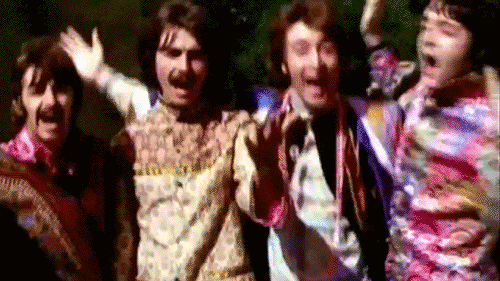
8. Oompah Oompah Stick It Up Your Jumper
I think, if you don't live in the UK, you might never have heard a cheesy compare somewhere shout "Oompah Oompah" and then wait for the audience to shout back, "Stick it up your jumper!"
Adding to the deliberately confusing lyrics, the music contains sampling from Shakespeare plays, the radio, chanting and other sounds, designed to confuse and add texture to the surreality. But even seemingly random sounds contribute to the meaning of the song. Chanting 'stick it up your jumper' is nonsense, and a reference (I think) to chanting Hare Krishna. Shakespeare's King Lear was apparently sampled at random, but the words 'untimely death' and 'rest you father' add an eerie feel.

9. Everybody's got one.
The final conclusion - everybody's got one. Got one of what? I think an interpretation of whatever they're reading; be it the lyrics of Strawberry Fields Forever, I Am The Walrus, Shakespeare, nonsense poetry by Lewis Carroll or maybe even the lectures John's heard recently from the Maharishi. And they're all simultaneously right and wrong.
This is of course only my opinion and you're free to disagree with me, but I think this is what I Am The Walrus is about and it's why l love that song. And one of the many reasons I love John. You might think I'm talking nonsense and you have your own ideas, theories and opinions, and that's okay because Everybody's Got One.
None of these gifs or images belong to me. I got them all from Gifhy. Crossposted from http://the-cosmic-empire.tumblr.com
Bạn đang đọc truyện trên: AzTruyen.Top